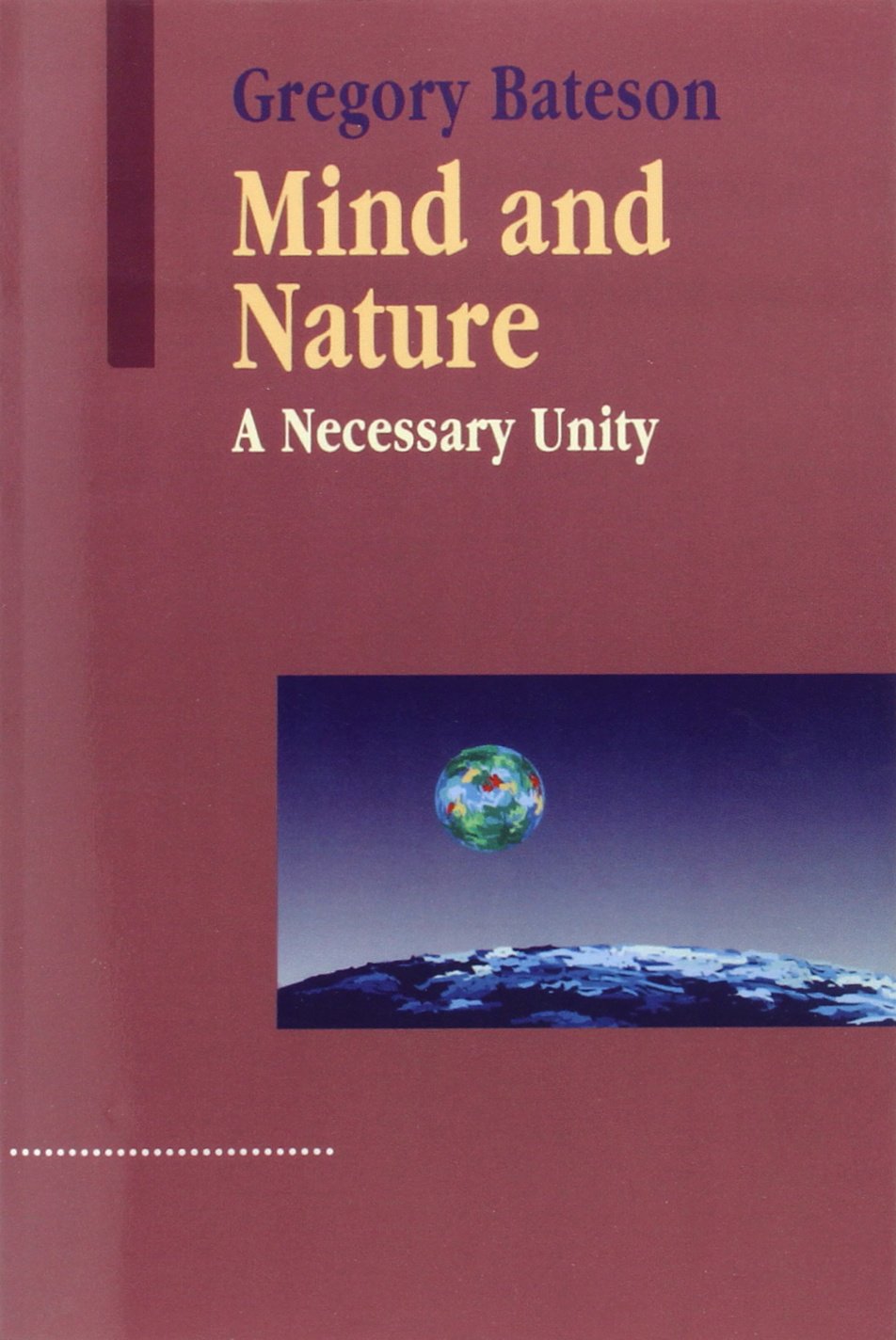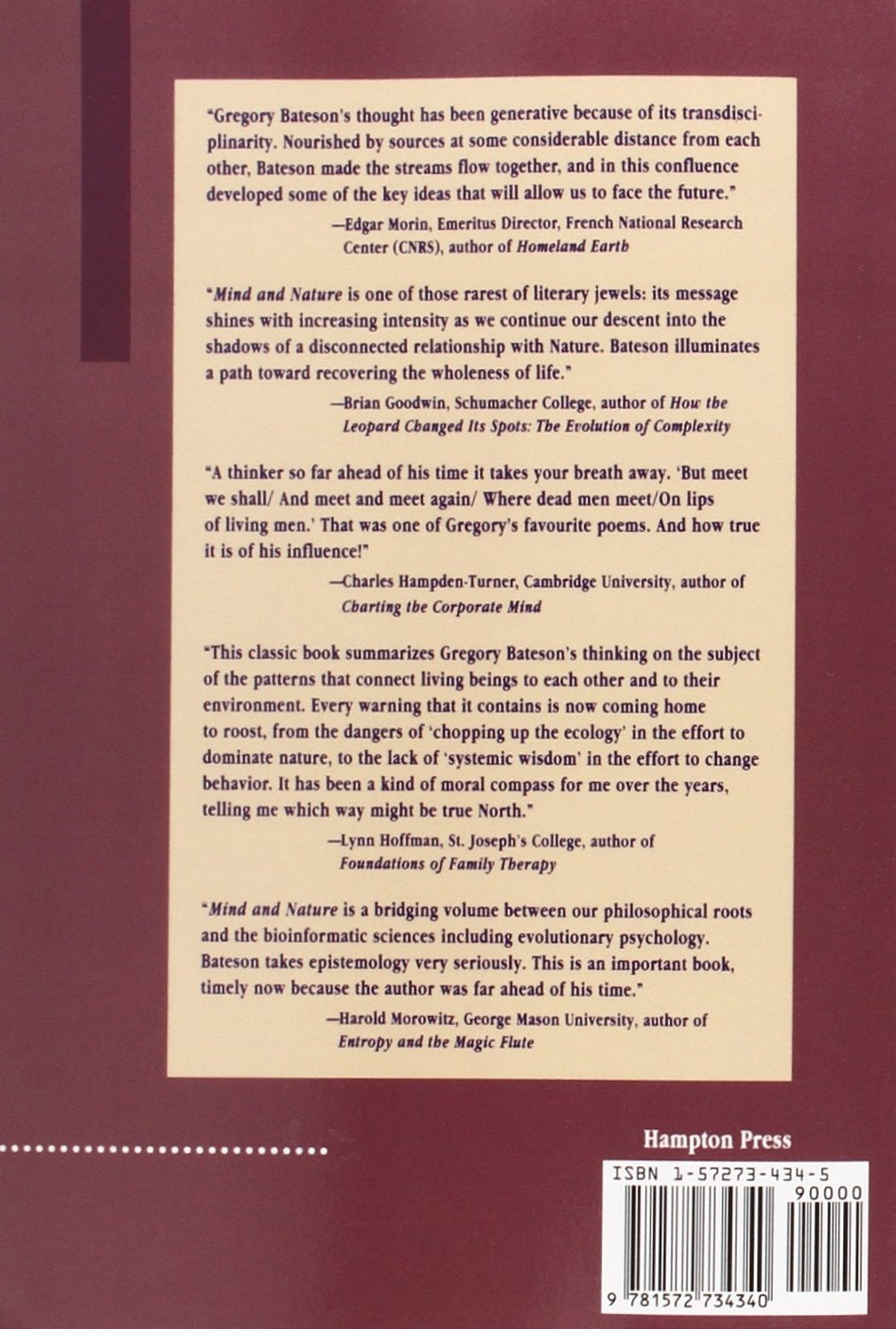Customer Services
Copyright © 2025 Desertcart Holdings Limited
Desert Online General Trading LLC
Dubai, United Arab Emirates




Full description not available
X**R
The most important book on epistemology there is
Gregory Bateson is one of the most important thinkers of the twentieth century. This is one of his last books and it deals with matters of epistemology. The thinking preserved within its pages is profound yet most of the time down to earth. There Bateson parts company with most formal epistemologists, the majority of whom are utterly confused, at least in their way of exposition. You do not need to be an expert logician to understand Bateson's thinking; he is the expert and tutors you through the straights of Scylla and Charybdis with the outmost comfort and safety. From this fantastic journey you will definitively be enriched.This book is one of his most important. It is a testament of his view of science and coming from a person who helped revolutionize more scientific fields than the average person has even heard of it should be taken seriously. In its pages Bateson tells us what science is and how it should be properly exercised. Given the confusion and nihilism that have followed on the pseudoscientific revolutions of postmodernism and decostructivism (read Focault, Derida or Judith Butler for instance) such readings are necessary if at times disturbing. Not all ways of doing science are equal and many of them are based on logical confusion. Bateson is clear on that point. On page 24 he tells us "Some tools of thought are so blunt that they are almost useless". Self-evident to most people this maxim needs to be restated and taken seriously, especially within the social sciences that have only succeeded in making minor steps since the time of Aristotle. In this book we learn the why of this unfortunate situation. The question is if anybody wants to listen...Still Bateson is not in any way preaching like some untouchable headmaster, unlike many other philosophers of his rank (read Jerry Fodor for instance). He is aware of the difficulties and obstacles involved and most of the time keeps his voice low. He also is not a techno-freak like many of the newest cognitive scientists, modern rationalists or evolutionary psychologists though he is one of their intellectual fathers. Instead he often talks of the need of a holistic approach, of looking out for the pattern which connects mind to nature and nature to the universe, and warns against the dangers of degrading the ecosystem and turning our backs to the fellow living creatures of this, still wonderful, planet.If you only read one book on the history of science or on epistemology make this one your choice. You wont regret it. It is a cybernetically quided misile which will hit you on the head, and change you forever. To the better that is.
M**N
That reminds me of a story...
This is a work of an exceptional and original genius."Mind and Nature" is both Gregory Bateson's most accessible and most difficult book. It is a deeply personal exploration of what has come to be called cognitive science from a brilliant man and great scientist who pioneered a deep synthesis of anthropology, language and communications, and biology over the course of a remarkable life. Be advised that it is more of a progress report on a lifelong quest than a coherent whole. If you have an enduring interest in cognitive science and you haven't read Bateson, you don't know what you are missing.Bateson's starting point is, "How is it possible for the same evolutionary forces that shaped our survival as a species failed to shape our minds?" The answer, of course, is that it is not. It ought to be self-evident that the phenomenon that we call the "mind" is shaped by natural selection. Bateson does not claim to understand all the implications of this empiricist stance, his focus instead is on how to start asking the right questions about the mind and cognition. For instance: What is learning? What is play? (Is it true that only mammals play? Why is that?) If you think about it, these are phenomenon central to the human experience and there is no one that discussed them more insightfully than Bateson does here (and in "Steps...".I find myself returning to this book again and again over the years. Its effect on me has been profound. I am sure I will never understand more than a small part of what Bateson is trying to tell me here, but the feeble fraction that I do understand is remarkable. The wisdom that animates this book has shaped many of the foundational notions of my life. It is full of life lessons.And that reminds me of a story about the time I incorporated one of Bateson's teaching parables from this book into a speech I had to give not too long ago....
D**T
Great read!
This was assigned to me for my neuro-linguistic programming class. It was so interesting.
A**4
amazing insights
I find every page has very interesting cross-disciplinary insights. Recommended for anyone into systems theory or the deep structures of life and thought.
R**R
Roots of Process Thinking
It's like this came to the surface briefly in the late 70's, and was absorbed into the tsunami of growth in cybernetics, anthropology and other disciplines (not to mention marketing) since then, so that most lay people don't even know it exists. Mind, nature, life, evolution, science, society: it's all just a big fully and deeply interconnected process, and Bateson provides the lens to see it with.
A**N
Pretty fair to say that this is my favourite non-fiction ...
Pretty fair to say that this is my favourite non-fiction book of all time. Bateson's oeuvre spans all the knowledge disciplines I have ever been interested in - art, science, psychology, anthropology, communication, animal behaviour, education...Epistemology qua cybernetics. Sure, it's old now, and some of the statements have been overtaken by recent developments in science, but the thinking is still sound, still relevant for humans in the world today..
C**T
not just sociology
A fusion of of philosophy and the social sciences.
E**Y
As a technical text - OK. As a general read - not so much.
I didn't find it very approachable (with perhaps one exception - the chapter on things every schoolboy should know). Somewhat of a tedious read.
J**D
The pattern which connects
This book is built on the opinion that we are parts of a living world.[1] Bateson offers the phrase the pattern which connects as another possible title for the book.[2] He writes that we have been trained to think of patterns as something fixed. It is easier and lazier that way, but it is all nonsense. The right way to think about the pattern which connects is to think of it as primarily a dance of interacting parts.[3]Logic and quantity turn out to be inappropriate for describing organisms, their interactions, and internal organization. There is no conventional way of explaining or even describing the phenomena of biological organization.[4] We are ignorant about available insights and unwilling to accept the necessities that follow from a clear view.[5] There is a strong tendency to invoke quantities of tension and energy to explain the genesis of pattern. Bateson believes that all such explanations are wrong.[6]The whole book is based on the premise that mental function is immanent in the interaction of differentiated parts. Wholes are constituted by such combined interaction.[7] Bateson believes that mental process always is a sequence of interactions between parts. He doesn't believe that elementary particles are minds in themselves,[8] but he also admits that he is not up to date in modern physics.[9] Contrary to Bateson I do believe that elementary particles have proto-minds. An elementary particle, like an electron, is in David Bohm's ontological interpretation of quantum theory a spatio-temporal entity, which has a proto-mental quality.[10]Bateson is very influenced by cybernetic thought. It's true that nature is full of circular processes, but a cybernetic system is not a living system. What if mind is immanent, not in the interaction of parts, but in nature itself? It's a simple idea which opens up an entirely new paradigm of thought.Notes:[1] Gregory Bateson, Mind and Nature: A Necessary Unity (Hampton Press, 2002), p.16.[2] Ibid., p.7.[3] Ibid., p.12.[4] Ibid., p.19[5] Ibid., p.20.[6] Ibid., p.49.[7] Ibid., p.87.[8] Ibid., p.86.[9] Ibid., p.93.[10] Paavo Pylkkänen, Mind, Matter and the Implicate Order (Berlin Heidelberg: Springer-Verlag, 2007), p. 204.
F**R
A remarkable thinker.
A fascinating book with many illuminating moments. Bateson explores the connections between the mind and nature and how these are connected; not just because somehow they must be or in terms of some kind of simple minded mechanistic byproduct of underlying mechanical processes but in a much richer fashion. He asks questions which bring to light what he calls "logical types", a kind of change in difference of kind or quality. In this way he is able to reinterpret the experiments of the behaviorists as well as the possibility of Lamarckism in evolution.The book starts off in a leisurely fashion, a kind of calm walk in the park of human understanding but then quickly escalates into deeper questions of a more academic bent. The fundamental questions he asks reveal much about what might be missing or unconscious from ordinary human thought as well as bringing to light the way that people thought about the world when the book was written. Much of his insights, I believe, arise from his anthropological experiences with native tribes.The only problem I sense is his tendency to hang on to the standard Neo-Darwinian model and treat it as the be-all-and-end-all in human thinking.
R**A
un maestro ancora attuale
Leggere in originale il testo di questo pensatore rivoluzionario permette di apprezzare ancora di più le idee "provocatorie" per il periodo e rendersi conto qule sia stato il suo contributo intellettuale per il mondo occidentale in quei decenni.Un libro da leggere e rileggere.
Trustpilot
5 days ago
2 days ago